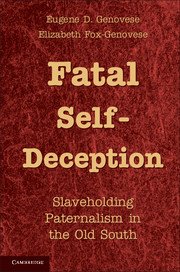1 - “Boisterous Passions”
Published online by Cambridge University Press: 05 June 2012
Summary
The Devil was to be overcome, not by the power of God, but by His righteousness.…But since the devil, by the fault of his own perversity, was made a lover of power and a forsaker and assailant of righteousness – for thus also men imitate him so much the more in proportion as they set their hearts on power, to the neglect or even hatred of righteousness, and as they either rejoice in the attainment of power, or are inflamed by the lust of it. Not that power is to be shunned as though it were something evil; but the order must be preserved, whereby righteousness is before it. For how great can be the power of mortals? Therefore let mortals cleave to righteousness; power will be given to immortals.
– St. AugustineIn Notes on the State of Virginia, a distressed Thomas Jefferson penned an indictment of slavery that reverberated for decades, causing Southerners no end of pain, anger, and soul searching:
There must doubtless be an unhappy influence on the manners of our people produced by the existence of slavery among us. The whole commerce between master and slave is a perpetual exercise of the most boisterous passions, the most unremitting despotism on the one part, and degrading submissions on the other. Our children see this, and learn to imitate it.…The parent storms, the child looks on, catches the lineaments of wrath, puts on the same airs in the circle of smaller slaves, gives a loose to his worst passions, and thus nursed, educated, and daily exercised in tyranny, cannot but be stamped by it with odious peculiarities. The man must be a prodigy who can retain his manners and morals undepraved by such circumstances.
Jefferson had predecessors for his anxiety over slavery's effects on masters. Educated Southerners knew Locke's psychological portrait of children as natural seekers of dominion. And they knew Montesquieu's critique of the master's unlimited authority, which Jefferson, in effect, paraphrased. The slaveholder, Montesquieu wrote, “insensibly accustoms himself to the want of all moral virtues, and thence becomes fierce, hasty, severe, choleric, voluptuous, and cruel.” The Reverend David Rice, father of western Presbyterianism, and other late eighteenth-century emancipationists assailed slavery for undermining the moral and political virtue of the white community, especially of its young men. In the 1760s, George Mason of Virginia denounced slavery for impairing the morals of whites, much as it had impaired the morals of the Romans and led to the decay of ancient civilization. Mason returned to the theme at the federal Constitutional Convention: “Every master of slaves is born a petty tyrant.” Oliver Ellsworth of Connecticut taunted him: If so, Mason and other Virginians should free their slaves. Ebenezer Hazard of Philadelphia described southern gentlemen in 1778: “Accustomed to tyrannize from their infancy, they carry with them a disposition to treat all mankind in the same manner they have been used to treat their Negroes.”
- Type
- Chapter
- Information
- Fatal Self-DeceptionSlaveholding Paternalism in the Old South, pp. 6 - 24Publisher: Cambridge University PressPrint publication year: 2011



